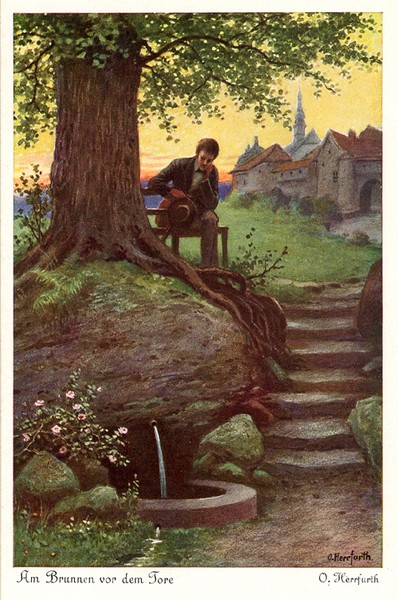Alberto Palacios tells us about one of the most famous songs of the repertoire, Der Lindenbaum, from Schubert's Winterreise. We'll listen to it performed by Dietrich Fischer-Dieskau and Gerald Moore. Thank you, Alberto!

We are already in summer, it begins that hotness we all know, and we avoid being exposed to burning sunbeams. What could be better than a fresh shadow, surrounded by the nature, with a sounding fountain, under a green and leafy tree like the linden: “Der Lindenbaum”. Starting this popular poem from Wilhelm Müller we meet our main character, a person who tell us how he lived and enjoyed this relaxing and peaceful scenery; the linden, a place for lovers, tree that for Müller has a close relationship with society and love, which contrasts with the loneliness that this poem exposes.
We should remember that this lied belongs to the famous cycle “Der Winterreise” (Winter Journey) from Franz Schubert. It’s quite right to be the fifth lied: it’s too soon to get into the deep melancholia of the cycle and the good memories of the past summer are yet remembered. Our poor protagonist has just been leaved by his couple in the first lied of the cycle, and in a cold night of winter he decides to start a journey. This idea of the journey has a strong base in the ideology of romanticism: “wandern” means to walk, the unconformity with what one has, the necessity of traveling in order to get away from unsatisfactory reality, to be happy there where you are not, etc., in other words, the human condition. Walker there is no path, the path its made by walking.
Be sensible to this music which is plenty of subtleties that aproach us to all these ideas. The contrast between the summer, a pleasant memory, and the current and cold night can be sensed in the piano part, in which the torrent of notes (that could represent the cold wind) changes radically into the other extreme: two notes. This happens in the very beginning but it’s perpetrated during the whole lied.
Just when our protagonist passes in front of the linden in the deep night, the tonality changes into minor (E minor). This gives to the music a darker and dismaler tone. The night is closely related with the world of dreams and the irrational, which explains what is coming, and that’s the linden murmuring a few words. I would say that the traveler gets afraid, but he decides to keep walking, the wind blows coldly in his face, he loses his hat and, empowered by the fear, he doesn’t even turn to get it back. In my opinion this is the climax of the lied, it reaches a strong sound and in a specially low tessitura for the singer.
Later, our traveller is already far from that linden, far from that surreal experience, the music comes back to the initial tonality (E major), the calmness is back again, but something is not the same, something has changed. If you focus in the piano accompaniment, it remains disturbed. It has now a different rhythm that could represent a kind of instability, the kind of emotional instability that suffers the walker, in which memory still resounds the murmured linden’s words: “Komm her zu mir, Geselle, hier findst du deine Ruh’!”, that means: “come here, my friend, here you’ll find the peace”, or could it mean the death?
Am Brunnen vor dem Thore
Da steht ein Lindenbaum:
Ich träumt' in seinem Schatten
So manchen süßen Traum.
Ich schnitt in seine Rinde
So manches liebe Wort;
Es zog in Freud' und Leide
Zu ihm mich immer fort.
Ich mußt' auch heute wandern
Vorbei in tiefer Nacht,
Da hab' ich noch im Dunkel
Die Augen zugemacht.
Und seine Zweige rauschten,
Als riefen sie mir zu:
Komm her zu mir, Geselle,
Hier findst du deine Ruh'!
Die kalten Winde bliesen
Mir grad' in's Angesicht,
Der Hut flog mir vom Kopfe,
Ich wendete mich nicht.
Nun bin ich manche Stunde
Entfernt von jenem Ort,
Und immer hör' ich's rauschen:
Du fändest Ruhe dort!
By the fountain, near the gate,
There stands a linden tree;
I have dreamt in its shadows
So many sweet dreams.
I carved on its bark
So many loving words;
I was always drawn to it,
Whether in joy or in sorrow.
Today, too, I had to pass it
In the dead of night.
And even in the darkness
I had to close my eyes.
And its branches rustled
As if calling to me:
"Come here, to me, friend,
Here you will find your peace!"
The frigid wind blew
Straight in my face,
My hat flew from my head,
I did not turn back.
Now I am many hours
Away from that spot,
And still I hear the rustling:
There you would have found peace!
(translation by Arthur Rishi)












